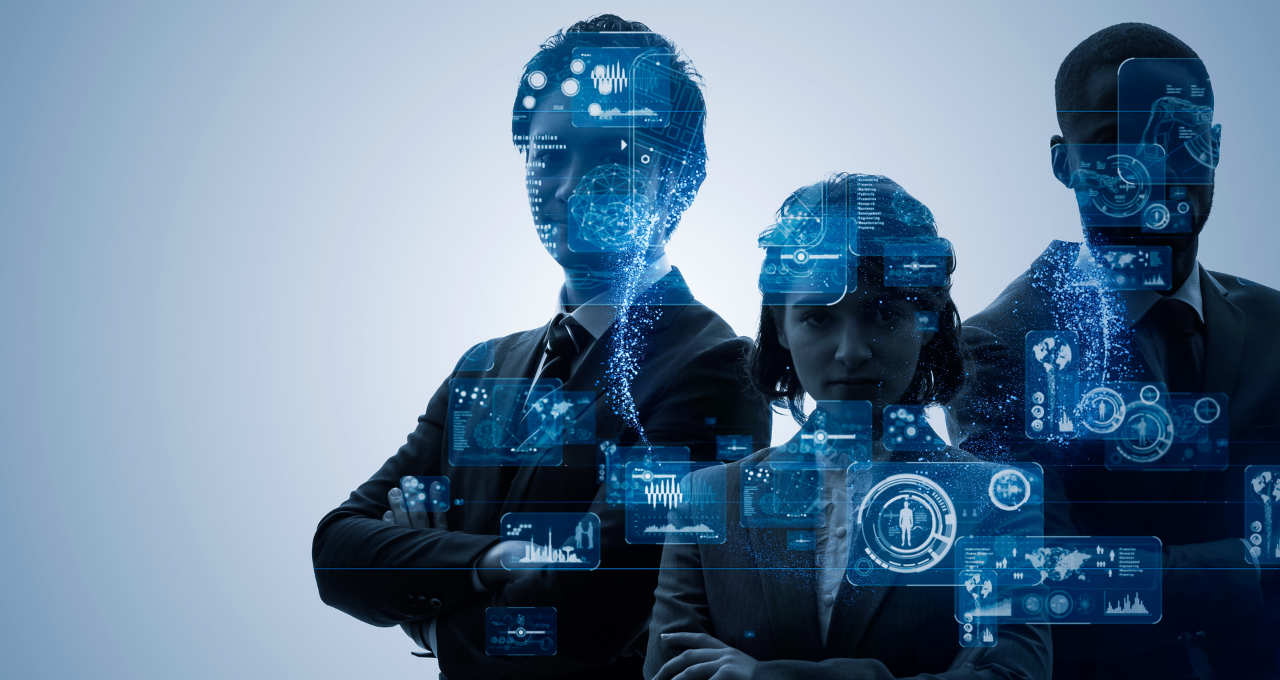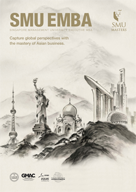
Artificial intelligence (AI), as fictionalised in the works of Nobel Prize-winning writer Kazuo Ishiguro, is often a trope for exposing schisms in society or shedding new light on modern humanity through a nonhuman, detached lens.
But beyond dystopian interpretations of AI in the literary world, this exciting field is imbued with revolutionary implications that will change the way we live and work. From a business growth perspective, AI can augment how decisions are made across organisational levels – with potential spill-over effects into society.
And human capital implications lie at the core of AI adoption in the workplace, as organisations are beginning to step up and manage AI more holistically. However, the lack of an adequate framework and know-how to meaningfully incorporate AI into existing business models is a challenge when it comes to transforming human capital in an age of AI.
As with any innovation, there are bound to be risks and unintended consequences in starting an AI journey.
“Artificial intelligence got a huge boost out of this pandemic as organisations doubled down in a lot of their digital investments to aid consumer experiences online as well as in other aspects of business,” says Dr Rick Smith, former Professor of Strategic Management and Deputy Dean of LKCSB.
“At the same time, human capital leadership has really taken some interesting turns and twists, as the internal people management, the capability of people inside the organisation, is becoming a little less clear.”
Dr Smith led the discussion on this and other issues in the webinar, Responsible Human Capital Leadership in the AI Era: Decisions, Dilemma and Dimensions, as part of the "Ideas Shaping Tomorrow" webinar series.
The series showcasing LKCSB's thought leadership in current and trending business topics is held in celebration of the school’s 20th anniversary.
He was joined by alumni guest speakers Adeline Lai (2019 Executive MBA graduate), Neha Monga (2021 Master of Human Capital Leadership graduate), and Clarabelle Koh (2021 Bachelor of Social Science graduate); as well as guest speaker Himanshu Tambe, Managing Director, Talent & Organisation/Human Potential, Southeast Asia, Accenture.
Here are some top ways that AI is transforming human capital leadership in the modern economy, and how organisations can uphold the responsibility of maximising this game-changing technology for positive impact:
1. Catching up with AI advancements
With the pandemic accelerating virtual work and automation, AI has further been brought to the forefront of interactions, resulting in organisations potentially having to play catchup on the technology’s many implications.
It might seem that machine learning and AI have only recently proliferated our daily lives and business economy. But, according to Mr Tambe, AI is not a new technology that we have to now contend with, but one conceived as far back as the 1950s by the likes of polymath Alan Turig.
He adds: “AI is not new but its time has come, and I think we are moving from experimentation to it being an exponential power.”
And just as how electricity led the growth of new industries such as agriculture and healthcare in the past, AI is rapidly and fundamentally changing the way organisations and agencies serve citizens, customers, and their employees and suppliers.
2. Sustainability of AI
While much is said about the ability of AI in transforming industry and the way we work, what many of us fail to think about is the large carbon footprint involved in training an AI system.
“The way an algorithm trains itself to, say, identify whether the image is a cat or a dog, requires millions of reference images, and you have to think about the energy that it's consuming in doing that,” notes Mr Tambe.
A 2019 study had revealed that the process of training a simple AI using a single high-performance graphics card resulted in a carbon footprint similar to that of a flight across the United States. As such, beyond challenges faced by human capital management, organisations also need to consider and mitigate the environmental impact of employing AI.
Conversely, Ms Koh also notes that innovative AI-enabled solutions to tackle climate change have recently emerged, such as a smart monitoring agricultural device that has been proven to determine irrigation patterns and recommend best watering cycles according to conditions like plant nutrition and hydration patterns.
3. Trust and transparency
The increasingly widespread employment of AI has also raised questions surrounding ethical challenges and responsibility, many of which are faced by various organisations for the first time.
“From an AI perspective, we want to think about how we do this in a way that is trustworthy and aligned with ethical standards,” says Ms Koh, who majored in Politics, Law and Economics.
“So the question will be, ‘where and how do we determine the moral, ethical compass, when it comes to AI decision making?’ And there's a lot to unpack.”
What is being brought to the forefront by AI is the issue of diversity and inclusion at the workplace, as, oftentimes, hidden biases are revealed to have been programmed into AI solutions with unintended, severe consequences.
She adds: “Decision making based on fairness and equality and developing algorithms is a lot easier said than done, because now, organisational leaders have to question their own cognitive biases, because they are the ones inputting these decisions into the AI algorithm.”
It is therefore important to drive research to nurture ethical and human-centric approaches to AI, in a bid to enhance, rather than replace, human intelligence. To this end, Singapore recently unveiled the model AI governance framework at the World Economic Forum to ensure organisations employ AI solutions that are transparent, explainable, and fair to consumers.
Such measures will also go a long way in reassuring customers, explains Ms Lai, Executive Director at Standard Chartered Bank, which has had to make the transition from traditional banking to machine-aided services.
“A lot of banks couldn't open during the Circuit Breaker period, which led to branches being permanently closed because customers have learnt to rely on our Chatbot and mobile banking services instead,” says Ms Lai.
4. Augment, not replace
One of the biggest, most-longstanding fear regarding AI adoption is the potential for machines to eliminate jobs and the need for human capital. As epitomised by the AI-gone-wrong film 2001: A Space Odyssey, during which supercomputer HAL 9000 was prepared to terminate a spaceship’s human crew, machine learning breakthroughs are often met with trepidation by traditional workers.
“I've heard, time and time again, particularly in financial services, that big tech is replacing humans in a lot of the jobs,” admits Dr Smith.
“But rather than ‘replacement’, the current thinking is more around ‘augmentation’ — how do we move from being scared of the tech and artificial intelligence to thinking about how does this augment the way that work gets done?”
Ms Monga, Director Product Marketing – Cybersecurity & Data Governance, Asia Pacific, Microsoft, also reiterates the ability for AI to help human talents at their jobs. She provides the example of breast cancer diagnosis and how pathologists now have the ability to reduce the error rate dramatically with the help of AI. However, the challenge lies in the proper training of artificial intelligence to ensure that human discrimination is not embedded in the machine learning narrative.
“You train the machine the way we teach students,” adds Ms Monga.
There was a recent example during which a big tech company had to withdraw the AI system that was used in recruitment, because the way the recruitment system was trained was based on historical data.
Ms Monga explains: “When you have historical data that is mostly white male, the AI system learns to only pick individuals who are white and male.”
“We need to start looking at AI differently, from machine learning to machine teaching — that's where you start to address the bias. There is a requirement for big tech to talk about fairness, transparency, privacy and security of data, accountability, how are we making big tech accountable — and that's what we all need to work on as well.”
Ultimately, as much as innovations in machine learning have progressed by leaps and bounds, the responsibility of how powerful technology is wielded lies in our very human hands.
“Organisations are spending more and more time on training responsible leadership and thinking a little more broadly about how we ingrain this into part of the way we work,” says Dr Smith.
“How do we bake the idea of responsible leadership into the very cultural equation of our organisation, and what are the right models of behaviour, not just at senior levels, but at all levels of the organisation?
While AI-driven automation does not appear to be rendering jobs obsolete any time soon, it is on track to take over routine job functions, freeing much-needed talent up for higher-level tasks. With all-important human judgment in place, especially with the buy-in of an ethical framework throughout a workplace, technology just might augment how we work — for the better.
Speak to our Admissions Advisors
Lee Kong Chian School of Business
Postgraduate Admissions
Singapore Management University,
SMU Administration Building
81 Victoria Street, Singapore 188065
Tel: +65 6828 0882
Join us at the upcoming events
Via Gerolamo Cardano, 1, 20124 Milano MI, Italy
1 Raffles Drive, Makati Avenue, 1224, Makati City
Bayerstraße 41, 80335 München, Germany
